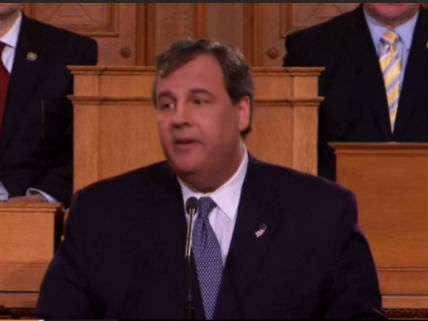Why Chris Christie's Vow to Suppress Marijuana Legalization Is Risky
Most Republicans think the feds should not interfere.

In an interview with talk radio host Hugh Hewitt last week, New Jersey Gov. Chris Christie declared that if he were president, he would "crack down and not permit" state legalization of marijuana. As far as I know, that makes him the first contender for the Republican presidential nomination to take that position. By contrast, Rand Paul, Ted Cruz, Jeb Bush, and Rick Perry all have said that states should be free to legalize marijuana without interference by the federal government.
If Christie thinks that promising to override state policy choices in this area will endear him to skeptical conservatives, he may be wrong about that. According to a Pew Research Center survey conducted last month, Republicans as well as Democrats agree with Paul et al. that the federal government should not try to suppress newly legal marijuana industries in states such as Colorado and Washington. Asked whether the federal government should "enforce federal marijuana laws" in states that have legalized the drug, 54 percent of Republicans said no, as did 58 percent of Democrats and 64 percent of independents.
Although most Republicans still oppose legalization, that does not necessarily mean they think the federal government should impose prohibition on states that reject it. Pew's numbers indicate that nearly two-fifths of prohibitionists oppose the sort of heavy-handed interference that Christie favors—testimony to the federalist convictions of conservative constitutionalists. Results from a 2012 CBS News survey reinforce that point: Although only 27 percent of Republicans supported Colorado-style legalization, 65 percent thought "laws regarding whether the use of marijuana is legal or not should be…left to each individual state government to decide."
In this light, Christie's promise to stamp out legal marijuana looks pretty risky as a strategy for appealing to Republican primary voters, let alone general election voters, most of whom not only oppose federal interference but support legalization. And it surely is not a good way to attract support from independents: According to Pew's numbers, 58 percent of them think pot should be legal, and 64 percent say the decision should be left to the states.
Christie's remarks could be a candid expression of his anti-pot prejudices rather than a calculated attempt to improve his electoral prospects. A former federal prosecutor, Christie was notably hostile to medical marijuana in his state, and he seems to sincerely believe that cannabis consumption cannot be tolerated. When Hewitt tried to move on from the subject of marijuana last week, Christie stopped him:
Hewitt: Right now, we've got the states of Colorado and Washington flaunting [sic] federal law by allowing people to sell dope legally. If you're the president of the United States, are you going to enforce the federal drug laws in those states?
Christie: Absolutely. I will crack down and not permit it.
Hewitt: All right, next…
Christie: Marijuana is a gateway drug. We have an enormous addiction problem in this country. And we need to send very clear leadership from the White House on down through the federal law enforcement. Marijuana is an illegal drug under federal law. And the states should not be permitted to sell it and profit from it.
States such as Colorado and Washington (soon to be joined by Alaska and Oregon) are not actually selling marijuana, of course, although they do "profit from it" by collecting taxes. It's not clear how Christie plans to stop that. As president, he could order the Justice Department and the Drug Enforcement Administration to raid and prosecute state-licensed marijuana businesses. But that would create a big political headache, especially if more states join the four that have already legalized cannabis for recreational use. By the time he took office, President Christie might be facing as many as 10 states with legal marijuana, including California.
Even if Christie were willing to commit the necessary resources and pay the political cost, there are limits to what he could accomplish for the prohibitionist cause. The federal government, which accounts for less than 1 percent of marijuana arrests, cannot realistically hope to bust a significant percentage of consumers or home growers, and it cannot legally compel states to help enforce the federal ban. With the exception of Washington, every state that has legalized marijuana so far allows home cultivation, as do the initiatives that are expected to appear on half a dozen state ballots this year and next. If President Christie managed to shut down commercial growers and retailers, home growing and informal sharing would step into the gap.
Despite the high cost and dim prospects of success, Christie may be willing to squander taxpayer money in an attempt to forcibly impose his pharmacological tastes on the entire country, including the parts where voters have emphatically rejected marijuana prohibition. But he should not expect his fellow Americans or even his fellow Republicans to applaud him for it.
[This post originally appeared at Forbes.com.]


Show Comments (97)